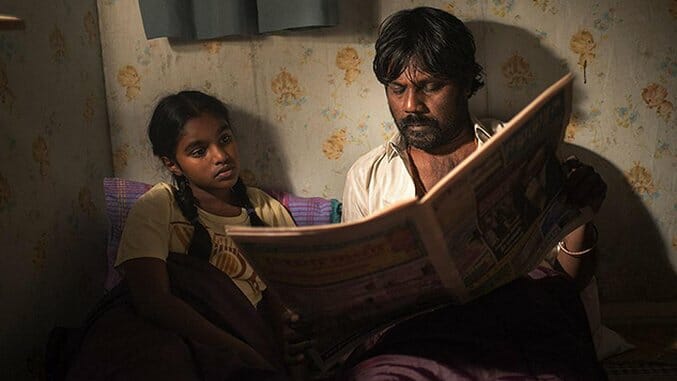
The first half of Dheepan is promising enough. The film’s title is the name of one of its main characters—it’s not Sivadhasan’s (Antonythasan Jesuthasan) real name, but the one he adopts in order escape from Sri Lanka and his past with the Tamil Tigers. A woman who takes the name Yalini (Kalieaswari Srinivasan) and a young girl who goes by Illayaal (Claudine Vinasithamby) in tow, Dheepan escapes to France, and all three of them pose as a family unit, living together in a rather dangerous housing block just outside Paris. Naturally, their lack of fluency in French throws obstacles into their abilities to ease into their new lives.
More challenging than that language barrier, however, is trying to maintain the illusion of being a close-knit family without much in the way of authentic familial warmth. The latter adds a fresh subtextual layer to the film’s near-sociological first half: Dheepan, at least in its early going, is as much about characters engaged in putting up a performative front as it is about refugees adjusting to life in an unfamiliar country. Through his closely observant eye, director/co-writer Jacques Audiard manages to generate some mild suspense as to whether they will somehow actualize into the family they’re pretending to be.
But then, midway through the film, Dheepan meets a former Tamil Tigers colonel (Vasanth Selvam) also hiding out in France. When he defies the colonel’s orders to secure more weapons for the group’s cause, saying his life as a revolutionary is over, the colonel viciously beats him up. It is at this point that not only does Dheepan take an unexpected psychological nosedive, but Audiard’s film takes a similarly disheartening, steep decline. Suddenly, with explosions of violence making life in that housing block even more perilous than before, Dheepan becomes less about sociology, family and performance than, much less interestingly, about machismo: one man’s desire to battle the gang that has taken over the block, behavior that is too simply chalked up to traumas he may have suffered as a fighter back in Sri Lanka.
This turn toward alpha-male insanity might have been more convincing if Audiard and co-screenwriters Thomas Bidegain and Noé Debré had bothered to fill in more details of Dheepan’s life in Sri Lanka beyond an opening sequence of corpses being burned and a cheesy recurring dream sequence involving an elephant. Without a sense of how his current traumatized state connects to the horrors he witnessed, and maybe even perpetrated, back home, Dheepan’s madness seems to come out of nowhere, barely motivated beyond minor hints of a controlling streak (“Stop making a face whenever I open my mouth,” he berates Yalini at one point) and a desire for the new family this fake clan implies.
Instead, this twist plays like little more than a paltry excuse for the film’s ridiculous shoot-’em-up climax, turning its main character into some kind of action hero as he tidily dispatches all of the problem elements endangering his makeshift family. In the end, Dheepan’s climax doesn’t so much inspire a feeling of hard-won satisfaction as it exudes a disappointing whiff of a huge missed opportunity.
Director: Jacques Audiard
Starring: Antonythasan Jesuthasan, Kalieaswari Srinivasan, Claudine Vinasithamby, Vincent Rottiers, Faouzi Bensaïdi, Marc Zinga
Release Date: May 6, 2016
Kenji Fujishima is a freelance film critic, contributing to Slant Magazine, Brooklyn Magazine, The Playlist and the Village Voice. He is also Deputy Editor of Movie Mezzanine and former editor-in-chief of In Review Online. When he’s not watching movies and writing and editing film criticism, he’s trying to absorb as much music, art and literature as possible. He has not infrequently been called a “culture vulture” for that reason.